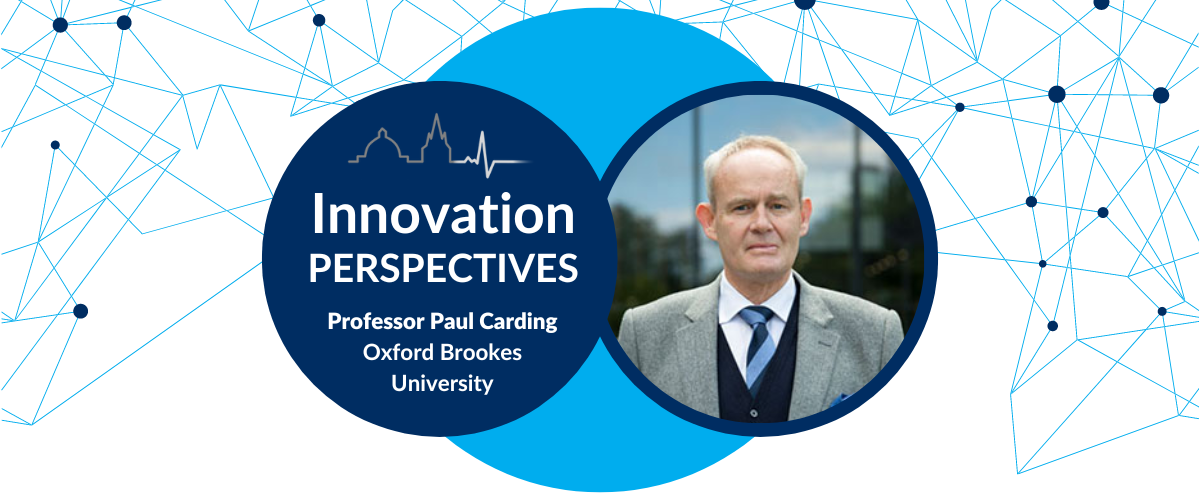Professor Paul Carding, Director of Oxford Brookes University’s Oxford Institute of Applied Health Research, discusses the push for Health Care Professionals to lead high-quality research and improvement, and emphasises the critical need for infrastructure, career pathways, and changed narratives.
There is little tradition of research in the nurses, midwives, and allied health professions. Where does this stem from?
For this group of professionals, which are now called Health Care Professionals (HCPs), rather than NMAHPs, I think historically research was not necessarily a key component of their training. This has changed considerably in the last 15 years. Secondly, I think there has been a perception that these professionals are there to deliver a service rather than to contribute to its improvement via high quality research. We’re working on changing that.
Thirdly, there’s been a lack of infrastructure and insight into how we build research-active clinicians in these professions. While research has always been part of the psyche of medical career structures, it hasn’t been the case for Health Care Professionals. We’re trying to build an infrastructure and place these opportunities within the infrastructure for those who wish to be research-active. This gives them the opportunity to drive the research questions that are relevant to them.
The NHS Workforce collaboration at Brookes has identified several research themes to improve recruitment and retention in healthcare professions. One of these is to tackle the public narrative surrounding theses professions. What impact is this having?
Changing public perception is, of course, a very difficult task. The media narrative is generally that there aren’t enough nurses, midwives, or allied health professionals, and that their role is to simply “provide care and rehabilitation.” We want to contribute to the narrative that these professionals don’t just deliver services, but are also knowledgeable consumers of the best research to inform clinical practice. By being at the forefront of the evidence-base, they can also drive the research agenda in their field. Because they are right at the forefront of healthcare delivery, they understand patient needs and understand what research questions will make the biggest difference to the NHS.
However, if we take people away from service delivery to do research, then there’s a risk it will deepen the narrative about a workforce crisis. We need to change this narrative to say that the more research-active our healthcare professionals are, the more engaged they are in service change and improvement, the better our recruitment and retention will be in these professions. This narrative has largely been lost. More research-active Health Care Professionals in part of the answer to the workforce crisis – not part of the problem.
Across the Oxford Academic Health Partners there is a strong will to develop a really sustainable pathway for Health Care Professionals who wish to do research. We want people who are clinically experienced to be the ones leading research in their areas. There’s a lot of research to say that the more research active your workforce is, the higher the quality of the clinical care.
So what steps need to be taken so Health Care Professionals can become part of the research infrastructure?
We’re now seeing this being recognised and informing how the NHS is run. For example, there are specific NIHR programmes to support leadership in Health Care Professional research. We also have specific funding streams for HCP research initiatives, and there’s a much stronger recognition at NHS Trust level that this has to be part of strategic planning. It’s all about creating pathways for clinicians who want to be research academics and doing it in a way that doesn’t drain resources. We also need to continue work to increase partnership working between NHS service providers and universities. This is a big opportunity for the Oxford Institute of Applied Health Research at Brookes, which will further strengthen our patient-facing health research and our education programmes for healthcare professionals.
We are also looking across the professions to identify barriers to engaging in research and how workplaces can support professionals to continue to develop their capacity for research. The medical profession has clearly articulated clinical academic pathways that enable people who work part-time in a clinical role whilst also doing research and teaching at a university level. We don’t regularly see similar opportunities for HCPs, so we’re trying to build them in through internships, part-time and full-time PhDs and Masters programmes, and jointly funded posts.
Oxford Brookes University’s contribution to involving communities of nurses, midwives and allied health professionals in research has recently featured in an NHS book commemorating 75 years of the NHS. What would you like to see change in the next 20 years?
It’s critical that we have a change in narrative, and that this group of healthcare professionals are seen as integral to the design and implementation of high-quality research that brings real benefits to patient care. We need the infrastructure and career pathways to make this accessible for all, so our workforce is driving world-leading research across the world.
Is it possible? I think it is. Perceptions have changed considerably in the last 10 years and there are quite a number of HCP researcher-leaders and role models now. While there’s still an enormous amount of work to do, we’re seeing strategies and funding in this area now. I’m very optimistic that in just ten years’ time we’ll be in a very different place to where we are now.

